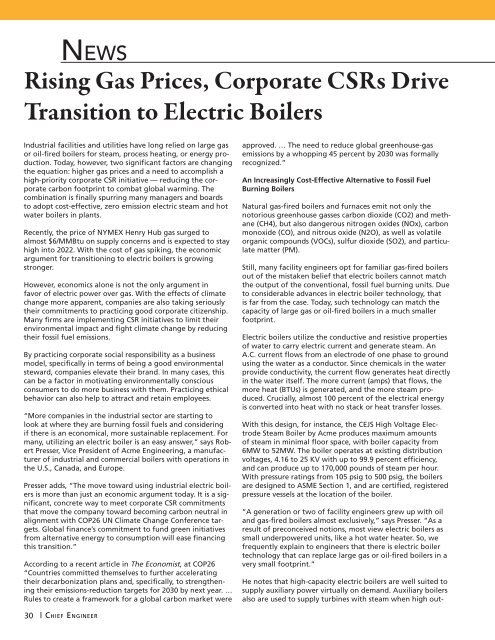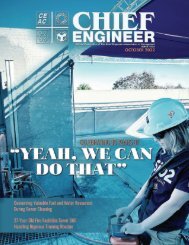CEAC-2022-03-March
You also want an ePaper? Increase the reach of your titles
YUMPU automatically turns print PDFs into web optimized ePapers that Google loves.
News<br />
Rising Gas Prices, Corporate CSRs Drive<br />
Transition to Electric Boilers<br />
Industrial facilities and utilities have long relied on large gas<br />
or oil-fired boilers for steam, process heating, or energy production.<br />
Today, however, two significant factors are changing<br />
the equation: higher gas prices and a need to accomplish a<br />
high-priority corporate CSR initiative — reducing the corporate<br />
carbon footprint to combat global warming. The<br />
combination is finally spurring many managers and boards<br />
to adopt cost-effective, zero emission electric steam and hot<br />
water boilers in plants.<br />
Recently, the price of NYMEX Henry Hub gas surged to<br />
almost $6/MMBtu on supply concerns and is expected to stay<br />
high into <strong>2022</strong>. With the cost of gas spiking, the economic<br />
argument for transitioning to electric boilers is growing<br />
stronger.<br />
However, economics alone is not the only argument in<br />
favor of electric power over gas. With the effects of climate<br />
change more apparent, companies are also taking seriously<br />
their commitments to practicing good corporate citizenship.<br />
Many firms are implementing CSR initiatives to limit their<br />
environmental impact and fight climate change by reducing<br />
their fossil fuel emissions.<br />
By practicing corporate social responsibility as a business<br />
model, specifically in terms of being a good environmental<br />
steward, companies elevate their brand. In many cases, this<br />
can be a factor in motivating environmentally conscious<br />
consumers to do more business with them. Practicing ethical<br />
behavior can also help to attract and retain employees.<br />
“More companies in the industrial sector are starting to<br />
look at where they are burning fossil fuels and considering<br />
if there is an economical, more sustainable replacement. For<br />
many, utilizing an electric boiler is an easy answer,” says Robert<br />
Presser, Vice President of Acme Engineering, a manufacturer<br />
of industrial and commercial boilers with operations in<br />
the U.S., Canada, and Europe.<br />
Presser adds, “The move toward using industrial electric boilers<br />
is more than just an economic argument today. It is a significant,<br />
concrete way to meet corporate CSR commitments<br />
that move the company toward becoming carbon neutral in<br />
alignment with COP26 UN Climate Change Conference targets.<br />
Global finance’s commitment to fund green initiatives<br />
from alternative energy to consumption will ease financing<br />
this transition.”<br />
According to a recent article in The Economist, at COP26<br />
“Countries committed themselves to further accelerating<br />
their decarbonization plans and, specifically, to strengthening<br />
their emissions-reduction targets for 2<strong>03</strong>0 by next year. …<br />
Rules to create a framework for a global carbon market were<br />
approved. … The need to reduce global greenhouse-gas<br />
emissions by a whopping 45 percent by 2<strong>03</strong>0 was formally<br />
recognized.”<br />
An Increasingly Cost-Effective Alternative to Fossil Fuel<br />
Burning Boilers<br />
Natural gas-fired boilers and furnaces emit not only the<br />
notorious greenhouse gasses carbon dioxide (CO2) and methane<br />
(CH4), but also dangerous nitrogen oxides (NOx), carbon<br />
monoxide (CO), and nitrous oxide (N2O), as well as volatile<br />
organic compounds (VOCs), sulfur dioxide (SO2), and particulate<br />
matter (PM).<br />
Still, many facility engineers opt for familiar gas-fired boilers<br />
out of the mistaken belief that electric boilers cannot match<br />
the output of the conventional, fossil fuel burning units. Due<br />
to considerable advances in electric boiler technology, that<br />
is far from the case. Today, such technology can match the<br />
capacity of large gas or oil-fired boilers in a much smaller<br />
footprint.<br />
Electric boilers utilize the conductive and resistive properties<br />
of water to carry electric current and generate steam. An<br />
A.C. current flows from an electrode of one phase to ground<br />
using the water as a conductor. Since chemicals in the water<br />
provide conductivity, the current flow generates heat directly<br />
in the water itself. The more current (amps) that flows, the<br />
more heat (BTUs) is generated, and the more steam produced.<br />
Crucially, almost 100 percent of the electrical energy<br />
is converted into heat with no stack or heat transfer losses.<br />
With this design, for instance, the CEJS High Voltage Electrode<br />
Steam Boiler by Acme produces maximum amounts<br />
of steam in minimal floor space, with boiler capacity from<br />
6MW to 52MW. The boiler operates at existing distribution<br />
voltages, 4.16 to 25 KV with up to 99.9 percent efficiency,<br />
and can produce up to 170,000 pounds of steam per hour.<br />
With pressure ratings from 105 psig to 500 psig, the boilers<br />
are designed to ASME Section 1, and are certified, registered<br />
pressure vessels at the location of the boiler.<br />
“A generation or two of facility engineers grew up with oil<br />
and gas-fired boilers almost exclusively,” says Presser. “As a<br />
result of preconceived notions, most view electric boilers as<br />
small underpowered units, like a hot water heater. So, we<br />
frequently explain to engineers that there is electric boiler<br />
technology that can replace large gas or oil-fired boilers in a<br />
very small footprint.”<br />
He notes that high-capacity electric boilers are well suited to<br />
supply auxiliary power virtually on demand. Auxiliary boilers<br />
also are used to supply turbines with steam when high out-<br />
30<br />
| Chief Engineer


















